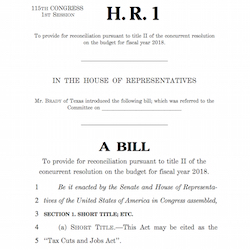
Advocates for senior living and affordable housing have expressed opposition to H.R. 1, the Tax Cuts and Jobs Act, proposed Nov. 2 by Republicans in the House of Representatives, because it eliminates the medical expense deduction and tax incentives for senior housing construction.
LeadingAge on Thursday convened a conference call with Sen. Bob Casey (D-PA), ranking member of the Senate Special Committee on Aging, and Sen. Catherine Cortez Masto (D-NV), a member of the committee, to discuss the “devastating” effects that the elimination of the medical expense tax deduction would have.
Casey called the move “an attack on middle-class seniors and individuals with disabilities.”
“Even though Medicare may cover a substantial share of seniors’ medical expenses, many seniors still pay thousands of dollar out of pocket for medical care, long-term care and prescription drugs every year,” he said.
Of the 8.8 million tax-filers who claimed the deduction in 2015, half had incomes below $50,000, and almost 70% had incomes below $75,000, Casey added. “For families paying for long-term care in an assisted living facility or a nursing home, and individuals experiencing an expensive medical emergency, the value of the deduction can be much higher,” he said.
The average deduction claimed by Americans totaled $10,000, Cortez Masto said. “These are individuals facing serious medical emergencies and paying for long-term care,” she said. “These deductions aren’t being claimed by wealthy people. These are middle-class families. …The increase in the standard deduction offered by Republicans right now would not nearly make up for that.”
Republicans hope to pass a bill quickly to appease their donors, Casey said, citing comments made by Rep. Chris Collins (R-NY) earlier in the week. But advocates could affect the political outcome through efforts similar to those that thwarted steep cuts to Medicaid proposed as part of unsuccessful attempts to repeal and replace the Affordable Care Act earlier this year, he said.
“I have never seen, in my lifetime, and certainly in the time I’ve been in public office, the kind of engagement in the context of the healthcare debate,” Casey said. “I think it’s starting to ramp up in a similar fashion in the tax reform debate.”
Senior living operators and others can educate members of the general public and the lay media by sharing examples of those who would be affected by the loss of the deduction, he said.
Letters to Congress
LeadingAge, American Seniors Housing Association and Argentum leaders sent a letter to House Speaker Paul Ryan (R-WI), House Minority Leader Nancy Pelosi (D-CA), House Finance Committee Chairman Kevin Brady (R-TX) and House Ways and Means Committee Ranking Member Richard Neal (D-MA) on Monday, explaining that the elimination of the medical expense deduction could force private-pay senior living residents to depend on Medicaid, “which is already a financially challenged program.”
“Our data shows that unless the medical expense deduction is retained in current law (and held at the 7.5% income threshold), seniors will expect an average tax increase of $1,800 next year — even at the lowest 12% bracket,” wrote Katie Smith Sloan of LeadingAge, David Schless of ASHA and James Balda or Argentum. “For seniors with more significant medical costs, such as someone living with Alzheimer’s, the impact will be much worse. We estimate that a resident living in a memory care community will incur out-of-pocket costs of at least $ 70,319 each year. Under current law, assuming a modest income level, they would have no tax liability. Under the new plan, they could face a tax liability as high as $6,100.”
The three organizations along with 58 others made similar points in a letter to senators on Wednesday.
Thursday afternoon, the Senate released its own tax reform bill that retains the medical expense reduction and differs from the House bill in other ways.
Construction and affordable housing
Senior housing construction and affordable housing advocates also oppose the House bill’s elimination of tax incentives that facilitate the production of such housing, including the tax exemption for multifamily housing bonds, the tax-exempt status of private activity bonds and the 4% low-income housing tax credit.
“With fewer and fewer projects, prices will rise and will force Americans to age in place depending only on the help of friends and neighbors,” LeadingAge’s Sloan said in a statement.
These aspects of the House tax bill also drew responses from the American Health Care Association / National Center for Assisted Living and the National Low Income Housing Coalition.
“Private activity bonds are a critical form of tax-exempt financing which long-term care providers utilize to fund new construction, make infrastructure improvements [and] develop affordable housing and other projects,” AHCA/NCAL President and CEO Mark Parkinson said in a statement. “Should this provision become law, it would severely threaten the ability of providers to make these investments in the future and would seriously damage operations for long-term care providers who deliver critical care for more than 1 million seniors and people with disabilities.”
NLIHC CEO Diane Yentel noted that the House bill preserves the 9% low income housing tax credit program but “eliminates private activity bonds, and the 4% credit and fails to include any reforms to the housing credit to incentivize deeper targeting to make units affordable to the lowest-income families.”
Also, she said, the 4% housing credit essentially would be eliminated because it is only available with debt financing from tax-exempt private activity bonds. “This will have a severe impact on the construction and preservation of affordable homes throughout the country,” Yentel said. “Private activity bonds, and with them the 4% credit, are estimated to contribute to upwards of 60% of affordable homes built or preserved each year.”
All told, she said, the elimination of private activity bonds would mean the loss of more 80,000 affordable homes each year because they would not be constructed or rehabilitated.



